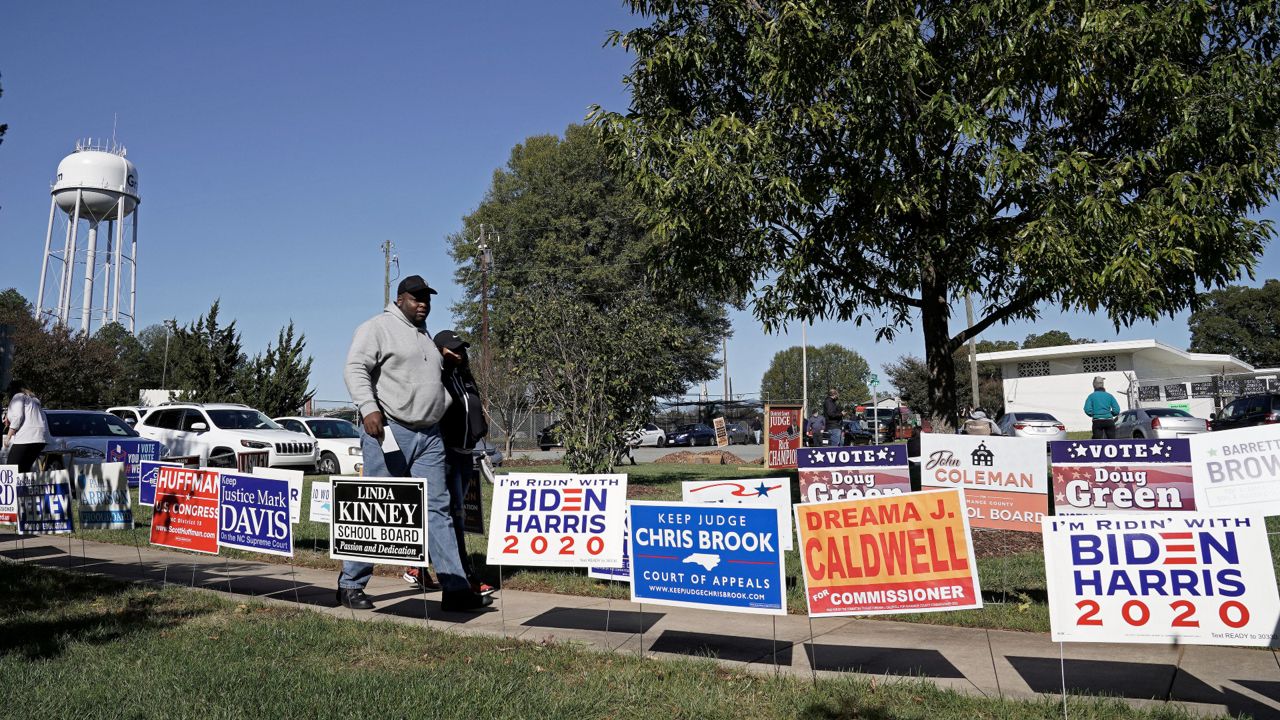North Carolina and the rest of the country may not know the final results of the presidential election in the state until Nov. 12. That’s when most counties will meet to count final absentee ballots, according to the State Board of Elections.
The races for president and U.S. Senate are still too close to call with about 117,000 outstanding absentee ballots that were not turned into county elections boards by Tuesday.
There’s no way to know just how many of those ballots will come in before the deadline on Nov. 12.
North Carolina saw record turnout for the election, with almost 75% of registered voters casting ballots.
The U.S. Supreme Court extended the deadline to allow North Carolina to continue collecting mail-in absentee ballots until Nov. 12. Ballots must be postmarked by Election Day.
President Donald Trump and Republican Sen. Thom Tillis both have slim leads in the state that may be too close to call until those remaining absentee ballots and any provisional ballots have been counted.
State law says those county boards of elections meetings have to be scheduled before Election Day, according to Katelyn Love, general counsel for the board. County boards will also count certified provisional ballots, but there’s no word yet on how many of those may be added to the results.
Tillis leads Democratic challenger Cal Cunningham by less than 100,000 votes, according to the unofficial results.
Tillis declared victory late Tuesday night, but major news organizations have held off on declaring a winner in the race. Whoever takes the seat in North Carolina could help swing the balance of power to either party in the Senate.
Trump has a lead of less than 1% in North Carolina’s vote count, with about 76,700 votes over Biden. With all the swing states still in play, North Carolina’s 15 Electoral College votes could help put either candidate over the top.
Gov. Roy Cooper, who comfortably defeated his opponent Tuesday night, urged patience with the elections process.
“I know that there are still a lot of important races that are too close to call and we must let the process work to be sure that all the legal votes are counted,” Cooper said at the start of his acceptance speech Tuesday night.
“The State Board of Elections has run things with the utmost integrity during a global pandemic and tough races and I believe that they will continue to do so,” he said, speaking outside the North Carolina Democratic Party headquarters.
There are a number of other races that are too close to call in North Carolina, including the state Attorney General race that has incumbent Democrat Josh Stein up by a little more than 10,000 votes.
“It was a great day to be a Republican in North Carolina,” State GOP Chair Michael Whatley said during a press conference Wednesday at the North Carolina GOP headquarters in Raleigh.
Republicans by all accounts had a successful night in North Carolina, especially with judicial races and in the state General Assembly.
Whatley said he is confident President Donald Trump and Sen. Thom Tillis will win their races after all the votes are counted.
He attributed the party’s success to the frequent visits Trump, his family and Vice President Mike Pence in the final weeks of the election. He also said the party’s ground game knocking on doors and getting out the vote was a major factor in their success Tuesday night.
Republican candidates won all five open seats on the state Court of Appeals and one on the state Supreme Court. Two seats on the Supreme Court, including chief justice, are still too close to call.
State House Speaker Tim Moore and Senate Majority Leader Phil Berger were also at the press conference to celebrate maintaining their majorities in the North Carolina General Assembly.
“Not only did we maintain the majority, we added four seats,” Moore said of the North Carolina House. There are two more seats that are still too close to call.



